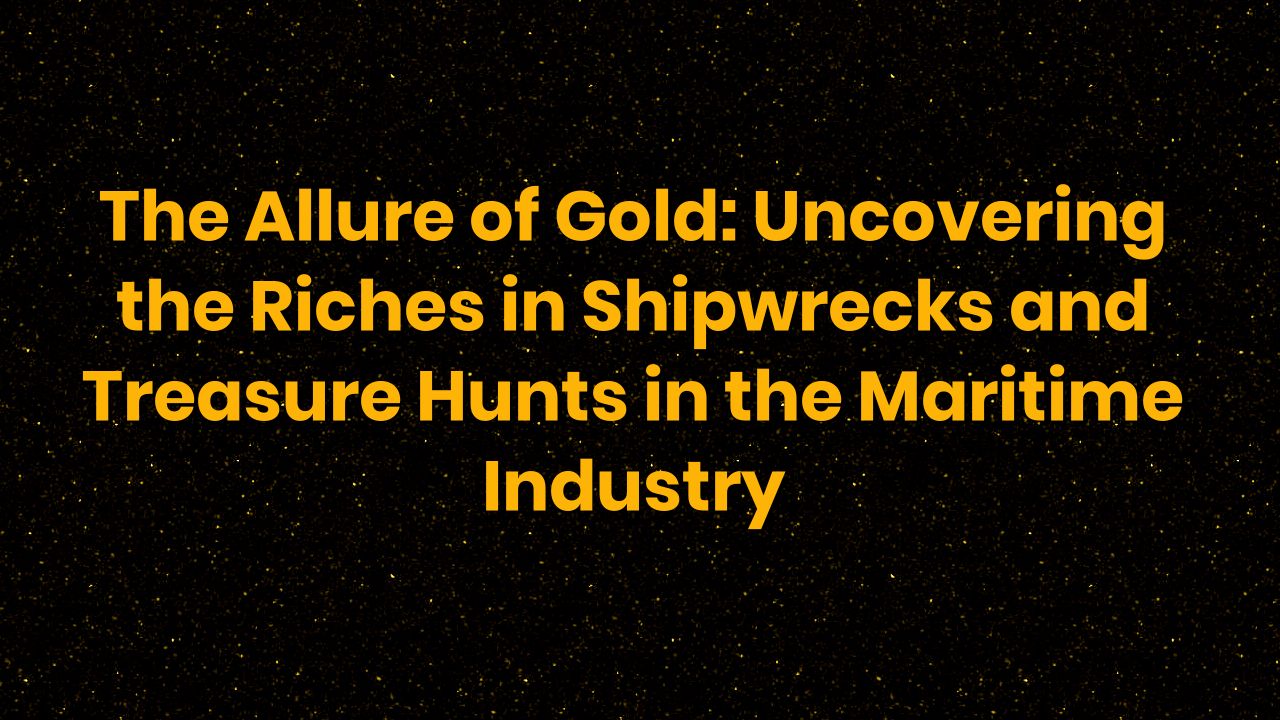
Table of Contents
Allure of Gold: Uncovering the Riches in Shipwrecks and Treasure Hunts in the Maritime Industry
The maritime industry has been linked to gold for centuries. The allure of gold has driven many people to risk their lives hunting for sunken treasures. Shipwrecks are the perfect place for gold to rest undisturbed, waiting to be uncovered. Treasure hunters have dedicated their time and resources to uncover these riches, and the rewards have been staggering. In this blog, we will explore the fascinating history of gold in the maritime industry, the challenges and reward of hunting for shipwrecks, modern technologies used in treasure hunting, the legal and ethical issues surrounding treasure hunting, and the future of gold in the maritime industry.
The Fascinating History of Gold in the Maritime Industry
Gold has been used as currency for centuries, and the maritime industry has always played a vital role in bringing this precious metal to market. The Age of Exploration, which began in the 15th century, saw an increase in global trade and an influx of gold into Europe. Pirates and privateers were also attracted to the riches of the maritime industry and sought to profit from it. During the 19th century, gold rushes in California and Australia led to an increased demand for shipping and the transport of gold. Today, the maritime industry remains a key player in the transportation of gold, with nearly 90% of all gold transported by sea.
The Hunt for Shipwrecks: A Challenging but Rewarding Endeavour
The hunt for shipwrecks is a challenge that only the most dedicated treasure hunters are willing to undertake. Locating a sunken treasure can require extensive research and expertise. The ocean is vast, and the exact location of many shipwrecks remains a mystery. However, for those who have successfully located a sunken treasure, the rewards have been substantial. The discovery of the Spanish galleon Nuestra Señora de Atocha in 1985, for example, yielded over $400 million in gold and silver.
Modern Technologies Used in Treasure Hunting
Advancements in technology have made treasure hunting more accessible and efficient than ever before. Sonar mapping, for example, can provide detailed images of the seafloor, allowing treasure hunters to identify potential shipwreck sites. Deep sea diving equipment has also improved, making it possible for treasure hunters to descend to great depths and explore shipwrecks. In addition, metal detectors capable of detecting gold and other precious metals have made it easier to search for treasure on the seafloor.
The Legal and Ethical Issues Surrounding Treasure Hunting
The search for sunken treasures can be fraught with legal and ethical issues. Many countries have laws that regulate the exploration and excavation of shipwrecks within their waters. In addition, some treasure hunters have engaged in unethical practices, such as looting and selling artifacts on the black market. It is important for treasure hunters to adhere to ethical and legal standards to ensure that these precious artifacts are preserved and protected.
The Future of Gold in the Maritime Industry: Opportunities and Challenges
The future of gold in the maritime industry is a mixed bag of opportunities and challenges. As technology continues to advance, it is likely that more shipwrecks will be discovered, presenting new opportunities for treasure hunters. However, the legal and ethical challenges surrounding treasure hunting will continue to be a concern. In addition, the rising cost of gold and the increasing demand for eco-friendly shipping practices may change the way gold is transported by sea.
Summary and Conclusion
Gold has always been an important part of the maritime industry, and the allure of sunken treasures has captivated treasure hunters for centuries. While the search for sunken treasures can be challenging, the rewards have been substantial. The future of gold in the maritime industry is full of opportunities, but it is important to navigate the legal and ethical issues surrounding treasure hunting. As technology continues to advance, the hunt for sunken treasures will become more accessible and efficient, but it is vital to adhere to ethical standards to ensure that these precious artifacts are preserved for future generations.





